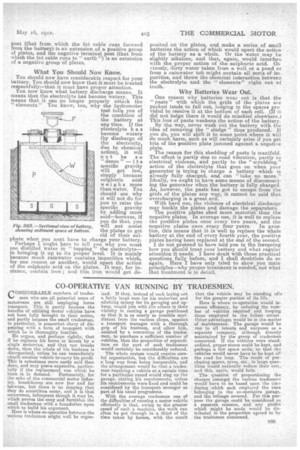CO-OPERATIVE VAN RUNNING BY TRADESMEN.
Page 27

If you've noticed an error in this article please click here to report it so we can fix it.
CONSIDERABLE numbers of tradesmen who are all potential users of motorvans are still employing horse transport,. This is partly because the benefits of utilizing motor vehicles have not been fully brought to their notice, and partly because the small tradesman, in particular, is somewhat chary of dispensing with a form of transport with which he is thoroughly familiar. He argues, and perhaps rightly, that if he replaces his horse or horses by a single motorvan, and that van breaks down, then the whole of his business is disorganized, unless he can immediately obtain another vehicle to-carry his goods. This is sometime more easily said than done, and may prove expensive, particularly if the replacement van which he hires is in demand. Fortunately, for the sake of the commercial motor industry, breakdowns are now few and far between, but there is no denying that they do sometimes occur, and it is that occurrence, infrequent though it may be, which proves the snag and furnishes the small tradesman with a foundation upon which to build his argument. Here is where co-operation between the various tradesmen might well be organ
izod. If they, instead of each laying out a fairly large sum for his motorvan and allotting money for its garaging and upkeep, would join with the others in their vicinity in renting a garage positioned so that it. is as nearly as nossible equidistant from the various shops, appoint a transport manager with a. thorough grip of his business, and allow him, assisted by a committee of the tradesmen, to purchase a sufficient number of vehicles, then the proportion of expenditure on the part of each tradesman would certainly be considerably reduced.
The whole system would require careful organization, but. the difficulties are a-long way from being insuperable, and the arrangement would be that a tradesman requiring a vehicle at a certain time for a particular round would ring up the garage, stating his requirements, unless his requirements were fixed and could be considered by the transport manager as part of his usual programme.
With the average tradesman one of the difficulties of running a motor vehicle efficiently is that, owing to the greater speed of such a machine, the work can often be got through in a third of the time taken by horses, with the result that the vehicle may be standing idle for the greqter portion of its life.
Here is where co-operation would increase efficiency, by reducing the number of vehicles required and keeping these employed to the fullest extent. Other advantages would be in the matter of maintenance. The garage would be run to all intents and purposes as a separate company, although directly maintained by the group of tradesmen concerned. If the vehicles were standardized, proper stores could be kept, and perhaps a few spare units, so that the vehicles would never have to be kept off the road for long. The result of purchasing spares, tyres, etc., in large quantities would naturally reduce their cost, and this, again, would help.
The question of proportioning the charges amongst the various tradesmen would have to be based upon the time during which each employed the vans belonging to the co-operative garage, and the mileage covered. For this purpose the garage could be considered as a separate concern, and any profits which might be made would he distributed in the proportion agreed to by the tradesmen concerned.
































